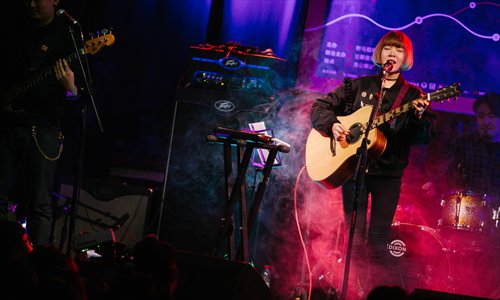As China’s rock scene matures, female musicians are finally starting to gain some recognition

South Acid MiMi Dance Team performs in Xiamen as part of their South China tour in 2015. Photo: Courtesy of South Acid MiMi Dance Team
It is late on a Tuesday night, 11 at least, and at Yugong Yishan a crowd of more than 500 people are crowded up against the stage. Standing about halfway back, Percy Gilbert tries to edge closer to the action, but after failing to squeeze his way through, decides to stay put to enjoy the final few songs of South Acid MiMi Dance Team's set. They are the final of six acts to perform at the inaugural Electric Lady Festival - a showcase celebrating female musicians - held on March 8 at Yugong Yishan.
This is the first time that Gilbert has seen South Acid MiMi, a Kunming-based band made up of three women with an average age of 26.
"They were really good," says Gilbert, a fashion designer from London.
"They were really experimental. It made them interesting to watch, but not only that, their sound felt fresh and new."
With a few notable exceptions, Chinese rock has traditionally been seen as the domain of men, from longhaired guitar gods to the boyish punk bands that took the stage in the 90s.
Yet recent years have seen a steady rise in female rockers covering genres ranging from indie to punk, electro and more.
Some of the biggest female musicians around have even become household names among rock fans, including Fu Han from Queen Sea Big Shark, Atom from Hedgehog, Jiang Xin, and the up-and-coming South Acid MiMi.
"Nowadays, you see more and more young ladies who are brave and free enough to realize their dreams," says Suna, the frontwoman of neo-electro-rock outfit Gemini.
"Female rockers have to deal with more risk, prejudice and pressure from their families and society, but all of the difficulties make them even better and cooler."

Gemini on stage at Beijing venue Post Mountain in 2015 Photo: Courtesy of Gemini

Musician Xu Fei performs at the Electric Lady Festival at Yugong Yishan on March 8. Photo: Li Hao/GT
Finding greater acceptance and exposure
"Since today is Women's Day, this next song, 'I Am an Unusual Flower', is for all the women out there," says Jiang Xin, leaning into the microphone. "Be the unusual flower in your own life."
Of course women aren't the only ones who came out for the all-female showcase that night. Among the fans in attendance is Huang Fei, a 32-year-old rock fan who came out specifically to see Jiang.
It's his first time seeing her up-close. "Her husky voice has a special attraction, as well as her simple style of clothing, just a tee shirt and jeans," he said.
Huang is also a fan of Helen Feng from Nova Heart and Fu Han.
He recalls that back in the 1990s, which is widely regarded as the heyday of Beijing rock, many male rockers like Cui Jian and the Magic Stone Three rose to nationwide fame, a level that few if any female musicians at the time ever attained. Today though, things are different.
"Rockers don't just represent a 'bad attitude' or 'improper lifestyle' anymore, so for female rockers it's become less of a burden and more of a way to express themselves creatively," says Suna.
"I think society is more and more open, especially toward female rockers."
She recalled that when she first joined a rock band as a university student, more than 10 years ago, her roommates were convinced that she had destroyed her prospects. In the end, she had to move out of her dorm.
It's thanks to pioneers like her, though, that the landscape has grown increasingly fertile for female musicians. According to Li Hongjie, founder of YEMA Live, which organized the festival, China is now home to an estimated 1,000 female rock artists and bands.
William Griffith, who runs the blog Live Beijing Music, agrees that the scene is stronger and more diverse than ever - and most importantly, it's become integrated.
"Female rockers are embedded in the scene so much that the label 'female rocker' doesn't even cross my mind when watching a band."
Among the reasons for this, he says, is increased exposure.
"Citizens are exposed more and more to music every day through television and the Internet, and fans can share their love for an artist on platforms like Chinese music streaming site Xiami," Griffith says. "People are responding."
Showing a different side
One of the things Huang likes about female artists is they often bring a greater - or at least a different - palette of emotions to their work that goes beyond the typical frenzied energy of many male rockers.
"When you see Fu jumping up and down onstage all crazy, you can feel her capriciousness," he says. "When you hear the song 'Sunflower' by Jiang, you can feel the love and tenderness, and it still can be very powerful."
Griffith, meanwhile, says that one of the things he likes best about his favorite female artist, Jia Huizhen, is her ability to tap into a raw, vulnerable side of herself that you don't often see with male singer-songwriters. "It comes off as genuine instead of manipulative," he said.
The question of style can be a fraught one for female musicians, who, as a minority in their field, often have their artistic choices scrutinized both by the public and by themselves. For example, Shishi, one of the singers from South Acid MiMi, recalls that they took a wrong turn at the very beginning by trying to imitate male rockers.
She recalls that they thought that if they screamed like men, it was subversion; if they played the guitar as fiercely as men, it was rock 'n' roll.
"Later we realized that fighting, and setting up an imaginary enemy to change the world is the way of men," Shishi says. "We can also be powerful from a female perspective, engaging love and real life, or the relationships between women. We can have our own way of doing things."
Fu told Metropolitan that she believes women have their own unique way of viewing the world, and that they are natural rule breakers, which is the essence of rock music.
"Through my work, I mainly want to express unrestrained freedom," said Fu.
"The degree to which you are accepted is not determined by whether or not you're able to perform like a 'man,' but by whether your work is really able to create a unique aesthetic."
Remaining challenges
Though female rock musicians have made a lot of progress in recent years, many say they still face opposition when challenging traditional "feminine" aesthetics.
Suna, for instance, said Gemini once performed a daringly iconoclastic cover of Teresa Teng's pop ballad "Sweet Honey Honey," only to be greeted with shock and even criticism from the audience.
"It is very difficult to subvert some traditions, especially in China," says Suna. "More difficult for women than it is for men."
In addition to challenging their listeners' sense of aesthetics, female rockers also hope that they can get more understanding.
"You can not exclude people who are coming to ogle you from coming to your shows because they think that female rockers are, you know, loose," says Shishi. "Before we became well known, the show posters people made for us would say things like 'Girl band!' or 'Hot girls playing electronic music!', disgusting stuff like that. But the real fans have stayed with us."
Of course, their name - an ironic dig at misperceptions of female bands - didn't help, Shishi laughs. "When people heard South Acid MiMi Dance Team, they thought they were coming to see a dance show by sexy girls."
"There still isn't equal participation between women and men, and sexism does exist in the [rock] community as a whole," says Nevin Domer, who runs a vinyl label in Beijing.
"While women artists gain respect onstage for their talent, they rarely hold positions of power offstage, and young women just starting off don't receive the same encouragement from their peers as their male counterparts."
Moving toward further integration
Though female rockers in China share a common experience, musicians interviewed by Metropolitan largely said that they are a diverse group, with a range of sounds, creative approaches and levels of integration in the larger scene.
"Female artists are often grouped together as their own genre, at best overemphasizing their femininity and obscuring the full range of expression in their music and at worst objectifying them as sex objects and downplaying their real artistic contributions," said Domer.
Fu, for example, thinks that her greatest feature is her androgyny, which allows her to be at times feminine, at times masculine, and sometimes even like a child.
"Women have proven their ability and creativity," she says. "Women might become the new men, just like the name of that TV series, Orange Is the New Black."
Domer added that the challenges these women face are not unique to the rock scene.
"If China can value women and their contributions on all levels, and if women can take on increased roles, not just as musicians but venue owners, and so on, then we, as audience members, will see them as the multifaceted musicians they are, not just through the intensely male gaze of our current music industry."
Griffith is also optimistic.
"The idea of making music for a living has always been difficult to accept, but as the scene grows stronger, we'll be seeing more and more 'mother rockers' out there," he said.
Newspaper headline: Queens of noise